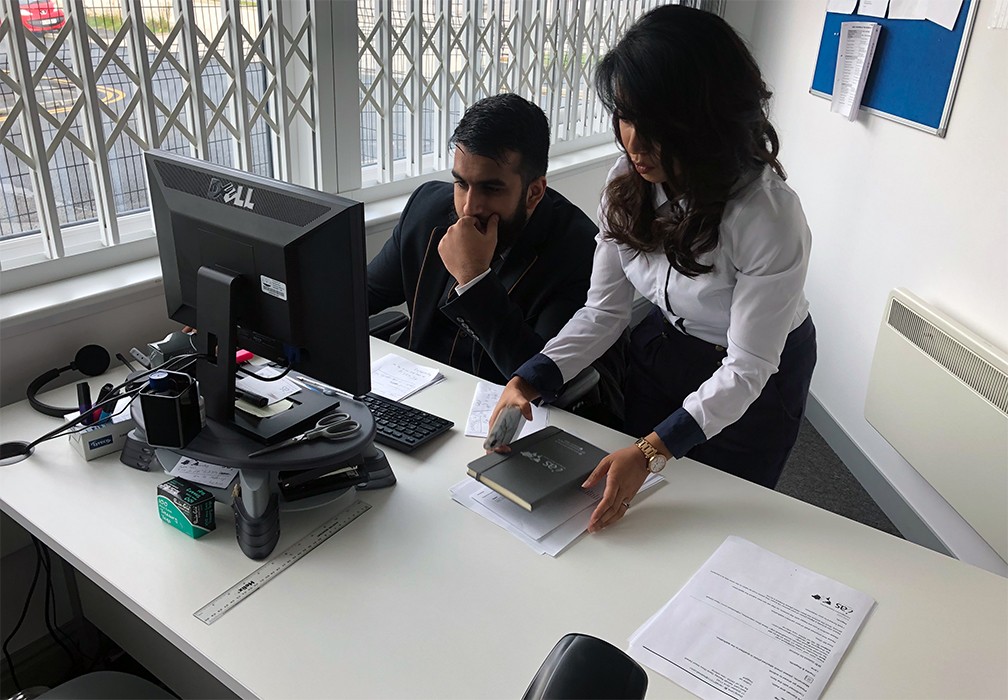Digital Nomad Visa Spain
Spain offers numerous appealing benefits to digital nomads. It boasts a rich culture, numerous areas of natural beauty, and appealing areas to live and work in both the city and the countryside. As such, many digital nomads choose Spain as a base for their remote work.
If you are a UK citizen who works as a digital nomad and is considering moving to Spain in order to continue with your remote work, it is likely that you will require a Digital Nomad visa. However, applying for this visa is often complicated and time-consuming. Contact Total Law today on +44 (0) 333 305 9375 to learn more how we can help to make your application process as smooth as possible.
Page Contents
- What is a Digital Nomad Visa in Spain?
- Who Can Apply for a Spain Digital Nomad Visas?
- Required Documents for Spain Digital Nomad Visa
- Apply for the Spain Digital Nomad Visa
- Cost and Processing Time for Spain’s Digital Nomad Visa
- Can I Renew my Digital Nomad Visa in Spain?
- Spanish Permanent Residence and Citizenship
- What is the Difference Between a Non Lucrative Visa and a Digital Nomad Visa in Spain?
- How Can Total Law Help?
- Frequently Asked Questions
What is a Digital Nomad Visa in Spain?
Spain’s Digital Nomad visa offers a route to living and working in Spain for those who work remotely, either for a company or in a self-employed capacity. If you work remotely and are looking to move to Spain and continue your remote work, this is likely to be the best visa route for you.
The Spanish Digital Nomad visa is valid for a year and can be renewed upon expiry. Once you are in Spain, you can also apply for the Digital Nomad Residence permit, which is valid for 3 years. This can also be renewed for up to 2 years. After this point, you may be eligible for permanent residence in Spain. After 10 years of living legally and continuously in Spain, you may also be eligible for Spanish citizenship.
In order to be eligible for the Digital Nomad visa, you must satisfy certain criteria, such as meeting the Spanish minimum income requirement.
Under this route, your spouse and children (or dependant close relatives) may also be eligible to join you.
Note that, if you are self-employed, this route also authorises you to complete a certain amount of work for a company within Spain, so long as this work does not total more than 20% of your total work activity whilst in Spain.
If you wish to start a company when in Spain, the Entrepreneur visa or the Self-Employed visa are likely to be better fits for your circumstances. Which one is right for you will depend on the nature of the business you wish to start, for instance if it is a unique and innovative business idea or a business which already exists in Spain. Alternatively, if you do not intend to work whilst in Spain on account of already having sufficient passive income, the Non Lucrative visa is likely to be the right choice for you.
Who Can Apply for a Spain Digital Nomad Visas?
In order to be eligible for this visa route, you will need to satisfy one of the following criteria:
- Work for a non-Spanish company as a remote worker (you must have worked there for at least 3 months)
- Be a freelancer or digital entrepreneur with different global clients
- You can also complete work for a company within Spain as either an employee or as a freelancer, although your work for this company must not exceed 20% of your total work activity
Under the Digital Nomad route, it is also possible for you to be joined by your spouse, children, or dependant parents, who can also apply as part of your application. In general, the following categories of family members can join you through this route:
- Spouse or unmarried partner (if you are not married, you must prove that your relationship is sufficiently similar to marriage, e.g. through cohabitation or shared finances)
- Minor children or dependant adult children (in the case of adult children, you will be expected to provide evidence of their dependant status)
- Parents (you will need to prove that your parents are your dependants. In general, they will need to be at least 65 years old, although exceptions are sometimes made on humanitarian grounds in the case of extenuating health needs, for example)

Required Documents for Spain Digital Nomad Visa
There are a number of documents which you will require in order to apply for a Spanish Digital Nomad visa. These are generally as follow:
- Completed application form
- Valid passport
- Passport photo, to the Spanish specifications
- Clean criminal record certificate (note that the certificate must still be valid, which generally requires that it must be from within the last 6 months)
- Medical certificate and proof of Spanish health insurance
- If you work for a company, proof that you have been working for them for at least 3 months
- If you are self-employed, proof of the length of your contract(s) and the terms and conditions for your remote work in Spain
- Proof of sufficient financial means. This is generally around €2,400 per month or €28,800 annually
- If your family members are also applying, the minimum income requirement will increase. In general, a family of 2 will require around €3,000 a month, a family of 3 will require around €3,240 a month, and a family of 4 will require around €3,510 a month. However, this will vary in line with the Spanish national minimum wage when you submit your application. Each additional dependent usually requires €600
- Evidence of a qualification from a higher education institution or a professional certificate which confirms at least 3 years of experience in your area of work
Note that additional evidence will also be required if family members are also applying alongside you. This evidence is as follows:
- Proof of familial relationship (e.g. marriage certificate, birth certificates, family records, etc.)
- If your children are adults, you will need to prove that they are still dependants (e.g. proof of their financial dependence on you)
- If your parents are also applying, you must prove that they are also dependants, i.e. that they are in your care. In general, they will need to be over 65 in order to be eligible, although exceptions are sometimes made on humanitarian grounds
Note that all documents must be translated into Spanish by an authorised translation service.
Apply for the Spain Digital Nomad Visa
In most cases, Digital Nomad visa applications should be submitted in person, via your local Spanish consulate or embassy. In the UK, these can be found in London, Edinburgh, and Manchester. You will need to provide all of the necessary documentation when you attend your local Spanish consulate or embassy.
Once your application has been submitted, you will be provided with a receipt which will allow you to track your application online. In most cases, a decision will be made in 10 days, though this may increase in cases where you are required to attend an interview or to provide additional documentation.
If you are successful, you will then be granted a visa. This visa must be collected within 1 month of you receiving the notification that it is ready.
In the case of the Digital Nomad visa, it is not necessary to obtain a Residence permit once in Spain, as your visa alone will be considered sufficient. However, if you do wish to obtain a Residence permit, you can do so via your local oficina de extranjeria or comisaria de policia once you are in Spain.
Alternatively, some applicants choose to enter Spain on a Tourist visa and apply for the Digital Nomad Residence permit once in Spain. If you choose this route, you will first need to submit an application for a Tourist visa, although you should ensure that you meet all of the necessary eligibility criteria for the Digital Nomad visa before entering Spain with the intention of switching your immigration status.
If your visa application is unsuccessful, you will be informed in writing. You have the option of appealing an unsuccessful visa application.
Cost and Processing Time for Spain’s Digital Nomad Visa
The visa fee for the Digital Nomad visa application is generally around €60 for up to one year or €73.60 for up to 3 years. However, there are also likely to be additional costs associated with your application, such as obtaining Spanish health insurance and translating your documents into Spanish. In some cases, applicants also choose to pay for legal assistance in order to streamline their application process. To learn more about Total Law’s services, contact us today on +44 (0) 333 305 9375.
In general, a decision will be made on your application within 10 days of submission. However, this may vary based on a range of factors, such as how many other applications are also being processed, whether any documentation is missing from your application, and whether you are required to attend an interview. In order to minimise delays, make sure to complete your application correctly and completely, and to promptly provide any additional information which is requested.
If you are successfully granted a visa, you must make sure to collect it within 1 month of being notified that it is ready for collection.

Can I Renew my Digital Nomad Visa in Spain?
If you continue to meet the eligibility criteria, you can indeed renew your Digital Nomad visa. You can also renew your Digital Nomad Residence permit. The visa is valid for 1 year and the permit is valid for 3 years.
If you apply first for the visa rather than the Residence permit, you can apply for the permit after 1 year of living in Spain. Alternatively, if you apply first for a Tourist visa and then apply for a Digital Nomad Residence permit once in Spain, you can renew your permit after 3 years, for an additional 2 years. After the 2 years have passed, you may be eligible to apply for Spanish permanent residency.

Spanish Permanent Residence and Citizenship
After living legally in Spain for at least 5 years, you can apply for Spanish permanent residence. This means that you will be able to permanently settle in Spain. If you have spent any time in Spain on either a Student or a Tourist visa, note that this will not count towards the 5 year minimum.
If you apply for Spanish permanent residence, you will need to provide a range of documentation, including proof of Spanish health insurance, proof of residence, your Residence card, and a valid passport. Make sure to apply within plenty of time of the expiry of your current Resident card in order to maintain your legal status.
After 10 years of living legally and continuously in Spain, you may be eligible to apply for a Spanish passport. Note that the continuity requirement means that you must not have left Spain for periods of greater than 3 months.
When applying for Spanish citizenship, you will need to satisfy a higher burden of evidence, such as demonstrating sufficient Spanish skills and knowledge of Spanish culture and society. You will also be expected to provide evidence of a clean criminal record.
Applying for Spanish nationality comes with a number of benefits, such as the ability to vote in Spanish elections and the right to a Spanish passport. Becoming a citizen of Spain will also grant you EU citizenship, which comes with the right to live, work and study in the rest of the EU, without requiring a visa.
What is the Difference Between a Non Lucrative Visa and a Digital Nomad Visa in Spain?
The Spanish Digital Nomad visa was not finalised until December 2022. As such, prior to this, many remote workers applied to live and work in Spain via alternative visa routes.
One of these alternative routes was the Non Lucrative visa. However, this is not a Work visa and does not actually authorise work in Spain. Instead, it is intended as a visa route for those who wish to live in Spain but do not need to work whilst there, on account of having foreign passive income. This income could take a number of forms, such as rent from non-Spanish properties or interest on dividends or savings. Additionally, this visa is only valid for 90 days, and so holders will need to apply for a Foreigner Identity card upon arrival in Spain.
If you wish to work whilst in Spain, the Non Lucrative visa is not the right route for you. Alternatively, if you are already financially self-sufficient and do not plan to work during your time in Spain, the Non Lucrative visa route is the better fit.

How Can Total Law Help?
Spain is a beautiful country with numerous opportunities for travel, a rich and varied culture, and numerous vibrant towns and cities. As such, many UK digital nomads choose to live in Spain whilst working remotely.
If you are a UK citizen looking to live in Spain whilst completing remote work, it is likely that you will require a Digital Nomad visa. This will authorise you to live in Spain whilst working remotely, either for a foreign country or in a self-employed capacity. However, applying for a Spanish Digital Nomad visa is often complicated. As such, many applicants choose to seek legal assistance with their application.
At Total Law, our legal advisers are experts on advising on cases like this. We offer a wide range of services, including help with your application, legal advice, and representation during the appeal process if you have already applied for a Spanish visa and have been unsuccessful. In order to learn more or to receive bespoke legal advice, contact Total Law today on +44 (0) 333 305 9375.
Advice Package
Comprehensive immigration advice tailored to your circumstances and goals.
Application Package
Designed to make your visa application as smooth and stress-free as possible.
Fast Track Package
Premium application service that ensures your visa application is submitted to meet your deadline.
Appeal Package
Ensure you have the greatest chance of a successful appeal. We will represent you in any case.

The Advice Package
During this untimed Advice Session with our professional immigration lawyers in London, you will receive our comprehensive advice, completely tailored to your needs and your situation.

The Application Package
With our Application Package, your dedicated immigration lawyer will advise you on your application process and eligibility. Your caseworker will then complete and submit your forms to the Home Office on your behalf.

The Fast Track Package
Our Fast-Track Application Package is a premium service for those who need to submit their application in time with their deadlines. Your case will become a top priority for our lawyers and you will benefit from our highest-quality services.

The Appeal Package
By choosing our Appeal Package, you can rely on our lawyers’ legal knowledge and experience to ensure you have the highest chance of a successful appeal. We will also fully represent you in any hearings/tribunals.
Related pages for your continued reading.
Frequently Asked Questions
No, if you are an EU citizen then you will not require a Digital Nomad visa in order to work remotely in Spain. This is because EU membership grants the right to live, work and study in the other EU member countries without the need for a visa.
However, since Brexit, UK citizens now require a visa in order to work in EU countries, such as Spain.
Yes, British citizens can work remotely in Spain. However, in order to be eligible, you will generally need to obtain a Digital Nomad visa.
If you intend to work for a Spanish company or to start a business in Spain, the Digital Nomad visa is unlikely to be the right route for you. Instead, you should consider the Entrepreneur visa, the Self-Employed visa, or a work visa which authorises work for a Spanish company, such as the Highly Qualified Professional visa. To learn more about which route is the best fit for your own work circumstances, contact Total Law today on +44 (0) 333 305 9375.
If you live in Spain for longer than 6 months, you will need to pay tax on your income. However, you will generally not need to pay as much tax as regular Spanish residents. Your tax will be paid through the Non-resident Income Tax Regime, through which you will generally only need to pay tax of between 15-24% of your income. This is compared to the 48% tax which regular Spanish residents are generally expected to pay.

